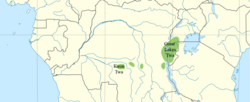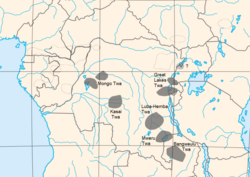Abatwa
 Twa populations according to Hewlett & Fancher. From west to east: Ntomba, Kasai, [unidentified], Great Lakes, Nsua [not clear if Nsua is Twa].  Twa populations according to Stokes. Only a few groups are shown, but these include several between the Kasai and Great Lakes Twa.  Twa/pygmoid populations according to Cavalli-Sforza. Several southern groups are added.  Twa populations scattered through shaded area, according to Blench. Several southern Twa areas are shown. |
|
| Languages | |
|---|---|
| Bantu | |
| Related ethnic groups | |
| Pygmies |
| Twa | |
|---|---|
| Person | Mutwa |
| People | Batwa |
| Language | (NA) |
| Country | Butwa |
The Twa (also Cwa) are any of several African hunting peoples or castes who live interdependently with agricultural Bantu populations, and who generally hold a socially subordinate position: They provide the farming population with game in exchange for agricultural products.
Abatwa/Abathwa/Batwa is a derivative root word common to the Bantu language group. It is often supposed that the Pygmies were the aboriginal inhabitants of the forest before the advent of agriculture. Vansina argues that the original meaning of the (Proto-Bantu) word *Twa was "hunter-gatherer, bushpeople", and that this became conflated with another root for Twa/Pygmy, *Yaka (as in Ba-Yaka). As the Twa caste developed into full-time hunter-gatherers, the words were conflated, and the ritual role of the absorbed aboriginal peoples was transferred to the Twa.
There is no Pygmy or Twa population that live independently of agriculture; all live near or in agricultural villages. Agricultural Bantu peoples have settled a number of ecotones next to an area that has game but will not support agriculture, such as the edges of the rainforest, open swamp, and desert, and the Twa spend part of the year in the otherwise uninhabited region hunting game, being provided with agricultural food by the farmers while they do so.
Roger Blench has proposed that Twa (Pygmies) originated as a caste like they are today, much like the Numu blacksmith castes of West Africa, economically specialized groups which became endogamous and consequently developed into separate ethnic groups, sometimes, as with the Ligbi, with their own languages. A mismatch in language between patron and client could later occur from population displacements. The short stature of the "forest people" could have developed in the few millennia since the Bantu expansion, as also happened with Bantu domestic animals in the rainforest, especially if there was additional selective pressure from farmers taking the tallest women back to the village as wives. However, that is incidental to the social identity of the Pygmy/Twa.
...
Wikipedia
